A nosebleed, also known as epistaxis, can happen to a cat for several reasons. Stopping this bleeding is the first order of business, but you should follow up with your veterinarian to investigate the reason it happened. Nosebleeds in cats can have obvious causes, such as facial trauma, that are readily treatable. Other causes, like organ failure or cancer, are more serious and may require intensive care.
A nose bleed happens when small blood vessels in the nasal or sinus cavities rupture due to trauma or pressure. Compromised organs or systemic toxins that affect a cat's blood coagulation can also spur nasal bleeding. Recognizing a bloody nose is pretty straightforward; either your cat's nose is actively bleeding from one or both nostrils, or dried blood may indicate a recent bleed. Find out more about the underlying causes of nose bleeds, how a diagnosis is made, and how this condition may be treated.
Causes of Nosebleeds in Cats
A nosebleed can be minor or serious depending on the cause. It may be triggered by coagulopathy (a clotting problem), vascular defect, or systemic disease. Below, we've listed some of the common causes of nose bleeds in cats.
Trauma
An injury to the head, mouth, or nose can cause bleeding internally or externally in a cat. Falls, being hit by a vehicle, fights with other animals, and other types of trauma may all lead to a nose bleed. Some types of trauma are more serious than others, especially if they cause internal bleeding.
Poison
Various rodent poisons can also be toxic to cats if they eat them and can cause nose bleeds due to the internal bleeding it creates. These causes are typically coagulopathies.
Medications
Some medications, such as antibiotics, chemotherapy drugs, antifungals, and hormones can have side effects that include nose bleeds.
Cancers
Cancer can cause a variety of issues in a cat including nose bleeds if cancer affects the head, nose, or sinuses. Sometimes it is due to pressure that a tumor puts on blood vessels or a bleeding tumor in the nasal passages.
Liver Failure
Issues with a cat's liver can result in nose bleeds due to a lack of clotting factors.
Kidney Failure
Renal issues including high blood pressure can result in nose bleeds in cats due to systemic or vascular causes.
Viruses
Occasionally some viral infections such as FIV and FeLV can cause nose bleeds in cats.
Blood Clotting Issues
If your cat has a disease such as immune-mediated thrombocytopenia or another problem that affects how well it forms clots then nose bleeds may occur. These are coagulopathy causes.
Ticks
Some ticks can cause blood clotting issues and therefore also nose bleeds in cats.
Fungal Infections
Fungal infections, such as Cryptococcus neoformans infections, in the sinus cavities and nasal passages can irritate and inflame blood vessels. This can result in nose bleeds in cats.
Dental Issues
If a tooth root becomes infected or there are other oral issues then a nose bleed may occur in a cat.
What to Do If Your Cat's Nose Is Bleeding
A nosebleed is easy to diagnose on sight, but determining the underlying cause (other than acute trauma) requires veterinary expertise. Your vet may perform laboratory tests x-rays, or ultrasounds to track down the reason your cat's nose began bleeding.
Treatment for Nose Bleeds
To control acute bleeding, sedation, ice on the nose, and even small amounts of epinephrine to constrict the blood vessels may be necessary.
If you see blood coming out of your cat's nose, take a damp cloth and gently try and wipe it away. Watch the nose closely to see if you can tell where the blood is coming from. Bleeding from the outside of the nose is likely due to an injury, so try to apply gentle pressure to the wound without obstructing the nostrils. If a large wound is present, veterinary attention is warranted.
If the bleeding is in fact coming from one or both nostrils, attempt to slow the bleeding with gentle pressure, but seek veterinary care as well.
Various medications, surgery, ablations/cauterizations, IV fluids, and even blood transfusions may be warranted depending on the severity of and reason for the nose bleed. If the cause is something that is not able to be corrected immediately, cats with chronic nose bleeding issues may benefit from an oral Chinese herb called Yunnan Baiyao, prescribed by your veterinarian.
The prognosis for a cat with bleeding due to minor trauma is excellent. The bleeding will likely stop quickly, and the wound will heal. All other causes of nosebleeds, including serious trauma, are more concerning and carry guarded prognoses based on their severity and staging.
How to Prevent Nosebleeds
While it's nearly impossible to prevent your cat from experiencing a nosebleed from any cause, it is important to address the issue right away and seek veterinary assistance if the cause is not readily apparent.

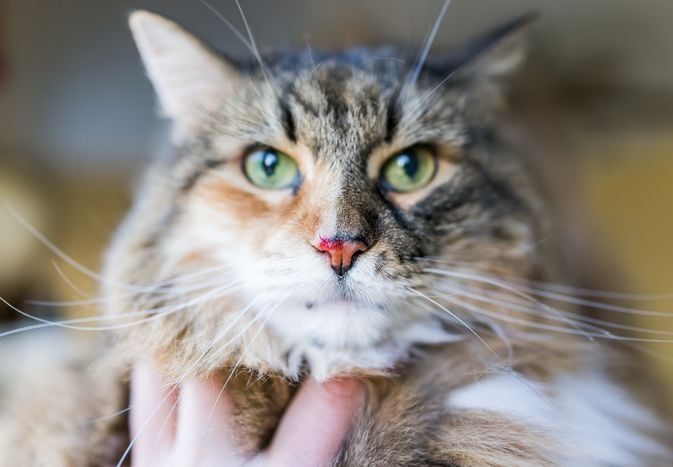
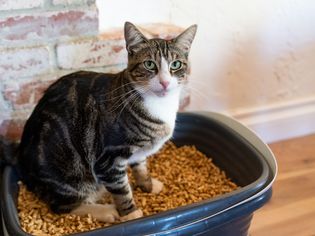
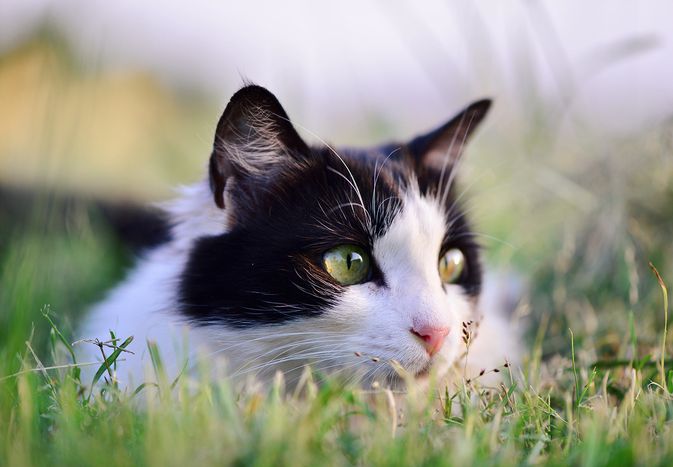

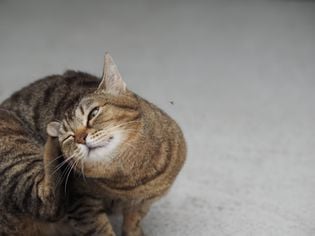
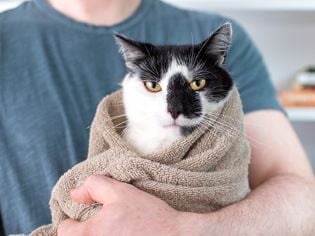
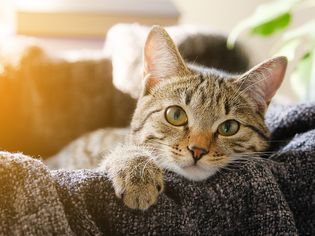

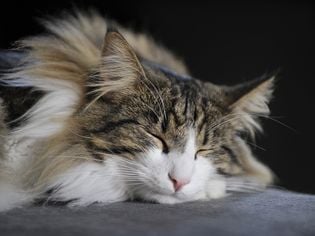
Comments on " Nosebleeds in Cats" :